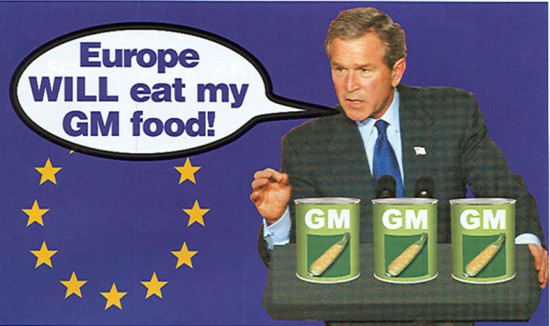When I first began to look at the issue of genetically modified organisms (GMOs) several years ago, my interest was in the larger contexts of their development and spread, as well as their impacts on the Global South. But the developments in the Global South are very much a part of the GMO story back home, where various versions of them are deployed in the GMO wars. The wars, rather than being settled, have only intensified over time. As I write this, a Monsanto-funded Missouri senator is grilling a prominent Ivy League physician about statements he made on the radio about the safety of GM foods. It’s interesting to turn my attention back to my own country to see how GMO issues are being used.
Political scientist E.E. Schattschneider (1960) argued that controversies are often won by the side that best broadens the scope to engage public audiences. Combatants in the GMO struggles got this message long ago. Most people in the United States don’t actually have an opinion on GMOs, which means they haven’t chosen a side, which means they are potentially recruitable if someone can find a way to strike one of their nerves. So GMOs are packaged as being about feeding the world, about autism, about nutrition in developing countries, about environmental hazards, about farmers killing themselves, about “terminator” technologies, about corporations playing God.
But the real prize in the contest for audiences are the prepackaged categories of liberal and conservative. Now here is a divide that everyone knows: a divide that is prepackaged with sets of values, a divide that is tied to political parties, and even their own networks. Can audiences be engaged on the basis of GMOs being cast as liberal or conservative?
The biggest pitch, by far, has been to conservatives, and the main tactic has not been to argue that there is something “conservative” about the technology but rather to gin up exasperation with liberal GMO critics. Thus, genetically modified golden rice found its way onto Fox News’s The Five, where Greg Gutfeld seethed about Philippine activists who were murderous creeps, and also about anti-Monsanto protesters. (Watch the clip. After Gutfeld claims the liberals were causing 700,000 deaths a year, his co-host reports that Greenpeace had contacted a Philippine tribe that had been isolated for thousands of years, causing them all to die.) Biotech booster Keith Kloor called GMO opponents “the climate skeptics of the left” and also used the tragedy of Indian farmer suicide to whip up hatred for activist Vandana Shiva and “liberal and environmentalist circles,” where GMOs are unpopular. Food Chain Communications, a company specializing in pit bull public relations for Big Ag, ridicules critics of GMOs (and industrial agriculture in general) as “liberal media bias” on steroids. (There was a discussion of this on the Culture and Agriculture website.)
Note that GMO opponents use the same strategy, as seen in the Friends of the Earth ad in The Ecologist linking GMOs with former president George W. Bush.
US politicians’ stances conform only roughly to the liberal/conservative alignment. Bernie Sanders’s proposed amendment to the Farm Bill that would have mandated labeling of GM foods garnered 27 votes—24 from Democrats, 2 from Independents, and a sole Republican vote. Montana Democrat (and farmer) Jon Tester is probably the most outspoken proponent of GM food labeling in the Senate. But there are many high-profile counter examples. GMOs made their (abortive) move into Europe on former president Bill Clinton’s watch, not George Bush’s, and both Bill and Hillary continue to be GMO enthusiasts. Meanwhile, conservative Christian famous farmer Joel Salatin is vehemently opposed.
Public perspectives on GMOs align poorly with the political spectrum. In a recent PLOS ONE article, Lewandowsky et al. reported on a sample of 1,001 respondents in which “opposition to GM foods was not associated with the worldview constructs … [which was] striking in light of reports in the media that have linked opposition to GM foods with the political Left” (2013).
Although Lewandowsky et al. did not break down the issues driving GMO attitudes, I am confident that at least on the environmental issues, attitudes tend to break along liberal/conservative lines. This is partly because the biggest story in the press on GMOs in the environment was the finding of transgenes in landrace maize in Mexico. This case featured Global South peasants on one side and neoliberal trade policies on the other, and liberals and conservatives will line up dependably.
But I think that a more alarming (although less publicized) environmental story is the escape of transgenes from Scotts bentgrass in Oregon, aggressively introgressing into wild grass communities (Zapiola et al. 2008) and now even jumping genus boundaries (Zapiola and Mallory-Smith 2012). I have yet to hear why this is a good thing from a conservative standpoint.
Glenn Davis Stone is an environmental anthropology on the faculty of Washington University in St. Louis. Much of his research concerns food agriculture, especially in the Global South. His blog is FieldQuestions.com.
References
Lewandowsky, Stephan, Gilles E. Gignac, and Klaus Oberauer. 2013. “The Role of Conspiracist Ideation and Worldviews in Predicting Rejection of Science.” PLOS ONE 8, no. 10: e75637.
Schattschneider, E. E. 1960. The Semisovereign People: A Realist’s View of Democracy in America. New York: Holt, Rinehart and Winston.
Zapiola, M. L., C. K. Campbell, M. D. Butler, and C. A. Mallory-Smith. 2008. “Escape and Establishment of Transgenic Glyphosate-Resistant Creeping Bentgrass Agrostis stolonifera in Oregon, USA: A 4-Year Study.” Journal of Applied Ecology 45, no. 2: 486–494.
Zapiola, MarÍa L., and Carol A. Mallory-Smith. 2012. “Crossing the Divide: Gene Flow Produces Intergeneric Hybrid in Feral Transgenic Creeping Bentgrass Population.” Molecular Ecology 21, no. 19: 4672–4680.
Cite as: Stone, Glenn Davis. 2015. “The FoxNewsization of GMOs.” EnviroSociety. 29 April. www.envirosociety.org/2015/04/the-foxnewsization-of-GMOs.

